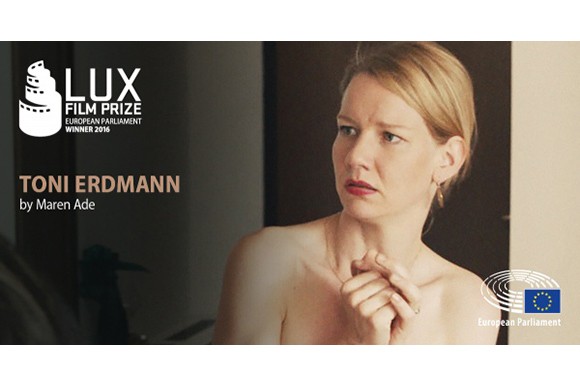Maren Ade’s story about a father and daughter trying to reconnect in tragicomic circumstances was voted the winner by the European Parliament
The winner of the 2016 LUX Prize is Toni Erdmann by German director Maren Ade, a story about a father and daughter trying to reconnect in tragicomic circumstances, set against the backdrop of contemporary European society. Toni Erdmann prevailed over As I Open My Eyes by Leyla Bouzid and My Life as a Courgette by Claude Barras.
Screened in competition at Cannes, the winner of the FIPRESCI Grand Prix for best film of the year, and the German submission for the Oscars, the film reveals deep social and economic divides, as the heroine’s perception of what constitutes a fulfilling life is turned upside down.
The LUX Prize, which this year celebrates its tenth anniversary, promotes cultural and linguistic diversity, and has two specific objectives: to boost the circulation of European films and to spread the debate on major issues faced by today’s society. From the official selection of ten films, three are nominated, and the Members of the European Parliament then choose the final winner. The three nominated films travel through the EU member states during the LUX Film Days, and are translated into all 24 EU languages (check the event nearest to you here), while the winner is further promoted and adapted for the visually and hearing-impaired.
The day before the ceremony, a press seminar was held with two panel discussions, moderated by Doris Pack, the LUX Film Prize coordinator. The first one was called “Cinema at Stake in the Political Agenda: Implementation Report on Creative Europe”, and featured speakers Silvia Costa, Chair of the Committee on Culture and Education, and Bogdan Wenta, Member of the Committee on Culture and Education. The seminar was introduced by the First President of the European Parliament, Antonio Tajani: “Europe is not a Europe of currencies, or of the banks; it’s a Europe that is rediscovering the importance of its cultural identity,” he asserted. The speakers provided an insight into the ways Creative Europe has been supporting the cultural and creative industry in very diverse areas – from film to video games. They also stressed the importance of the programme for small countries and explained the way in which the new Guarantee Facility would enhance investment in the sector. Wenta stressed a few areas where improvement is needed – namely, audience development, and film circulation, translation and promotion. “We have to facilitate access for all citizens to European independent cinema,” said Costa.
Read more at www.luxprize.eu




















